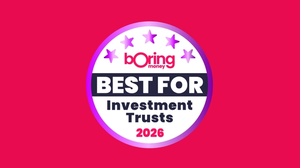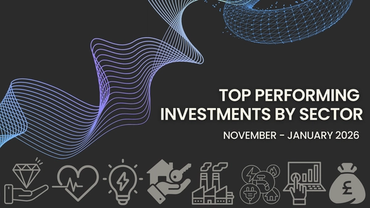Home • Articles • Investing wisely in 2025: How Mid Wynd International strives to stay ahead of the curve
Investing wisely in 2025: How Mid Wynd International strives to stay ahead of the curve
By Boring Money
20 Mar, 2025
This content is a paid promotion and has been created in collaboration with Lazard. It is an advertorial designed to promote Mid Wynd International Investment Trust plc. While we strive to ensure the information provided is accurate and relevant, it reflects the views and messaging of the sponsor.
In an age of investment trends and hype cycles, finding a strategy that can deliver consistent, long-term returns without succumbing to speculation is crucial. We look at how Mid Wynd International Investment Trust’s highly selective, quality-driven approach avoids trend-chasing and focuses instead on discovering fundamentally strong, future-facing businesses.

With economic and geopolitical uncertainty hanging in the air, a prudent, well-researched investment strategy remains important in navigating market challenges. 2025 already brings a range of global challenges – from persistent inflation to potentially significant shake-ups in trade policy – and investors may be considering ways to manage risk and seek opportunities for growth in the months ahead.
Against this turbulent backdrop, Mid Wynd’s disciplined focus on high-quality “compounders” could prove to be a particularly valuable strategy. It employs a stringent selection process that identifies companies that it believes have strong competitive moats, high capital returns, and a proven ability to reinvest those returns at a similarly high rate to drive future growth.
Discerning fact from fad: Avoiding the hype trap
Financial markets are no stranger to hype cycles. When a particular sector or trend gains mainstream attention, valuations can rise significantly beyond what is ordinarily justified by the underlying fundamentals. We have observed this pattern repeatedly over the past few decades. Consider the dot-com boom of the late 1990s, the recent surge in cryptocurrencies, and the current excitement surrounding artificial intelligence (AI).
AI undeniably has transformative potential. Still, valuations for some AI-related stocks have risen to very high levels, and a handful of these names have been the primary drivers behind much of the broader stock market gains over the past couple of years.
Behind the hype, however, criticism has been brewing about the distinct “narrowness” in the market. Indeed, US stocks and the tech sector dominated headlines, while many other regions – such as Europe, Japan and emerging markets – and sectors, including materials and healthcare, noticeably lagged.
Recent events are a reminder that the market in the short term is a voting machine and in the long term a weighing machine. We are long-term investors and look forward to the scales tipping.
Mid Wynd’s fund managers highlight that just 27% of the S&P 500’s constituents outperformed the US index over 2024 – an even lower proportion than during the dot-com bubble.
That said, investors who did jump into headline-grabbing stocks, such as leading chipmaker Nvidia, without due diligence subsequently found themselves exposed to significant volatility, as seen in the sharp corrections that followed periods of excessive enthusiasm.
To this point, despite reaching dizzying highs in recent years, Nvidia shares are down almost 20% year-to-date, at the time of writing. Towards the end of January, the chipmaker saw almost $600 billion[1] wiped off its market value – marking one of the largest one-day losses in history - following the launch of controversial Chinese AI chatbot DeepSeek. This serves as a reminder of what can happen when share prices detach from fundamentals.
Mid Wynd’s investment strategy is designed to steer clear of hype-hunting and its associated risks. Instead of chasing trends, the trust focuses on high-quality businesses that demonstrate sustainable competitive advantages. These so-called “compounders” aim to generate consistent returns on invested capital, have strong pricing power, and maintain financial resilience over the long term.
A prime example of this strategy in practice is Mid Wynd’s historical approach to the technology sector. Rather than following the fad into volatile, high-growth stocks, the trust’s managers instead assess the market to identify established businesses with proven revenue streams and strong profitability metrics. The aim is to filter the options down to find companies that have the potential to remain relevant and profitable in the years ahead.
Structural benefits: How investment trusts are designed for durability
While the makeup of the portfolio is crucial, the structure of an investment trust also plays a significant role in wider attempts to weather market turbulence. Here are some of the structural advantages of investment trusts, like Mid Wynd, that can help when the going gets tough:
1. Closed-end structure can provide greater stability
Unlike open-ended funds, which must buy and sell assets based on investor inflows and outflows, investment trusts have a fixed pool of capital. This structure allows the trust managers to take a long-term perspective without being forced to sell assets at inopportune times to meet trade requests. In practice, this means Mid Wynd aims to maintain its positions in high-quality companies even during periods of market volatility, rather than being compelled to sell assets when sentiment turns negative.
2. Independent oversight helps safeguard investors’ interests
Investment trusts also benefit from an independent board of directors, which provides an additional layer of governance. This helps to ensure management decisions are aligned with the best interests of shareholders, rather than being driven by short-term performance pressures. The Mid Wynd Board also monitors the Trust’s ongoing strategy, helping to maintain alignment with long-term investment objectives.
Ultimately, the Board aims to maximise shareholder value and safeguard their investments. This may offer some much-needed reassurance to investors, especially during turbulent and uncertain times.
3. Active discount management keeps it real
Another unique feature of investment trusts is that their shares can trade at a premium or discount to their net asset value (NAV) - the total value of all their underlying holdings. While not all trusts take this approach, Mid Wynd actively manages its discount or premium by conducting share buybacks or issuances. This strategy can help narrow the gap between the share price and the NAV, reducing excessive deviations and promoting greater price stability for investors.
Investing in 2025: The importance of maintaining a long-term focus
Back to the future now, and as 2025 unfolds, investors face a range of macroeconomic challenges.
In the UK, inflation remains a significant concern, rising to 3.0% in early 2025, surpassing expectations and complicating the Bank of England’s decision-making. Further afield, the US and its major trading partners continue to battle over hefty trade tariffs, and the world awaits a resolution to conflicts in Europe and the Middle East.
All in all, central bank interest rates could remain higher for longer - which would put pressure on equity and bond markets - while global geopolitical tensions keep investor sentiment on tenterhooks. That is all to say that the path ahead for 2025 looks all but certain.
Despite these headwinds, Mid Wynd’s commitment to long-term investing is designed to look through short-term shocks by keeping an eye firmly on the future. Here’s how some of its core objectives seek to keep it on track:
1. Quality companies can weather economic cycles
Companies with strong balance sheets, pricing power, and sustainable competitive advantages have the potential to perform better over market cycles. Mid Wynd’s fund managers prioritise these attributes when curating the portfolio, aiming to ensure it is built upon businesses that they believe can maintain profitability over the long term.
2. Compounding targets superior returns over time
Another key advantage of investing in high-quality “compounders” is their ability to reinvest earnings at high rates of return. Over time, this compounding effect has the potential to generate exceptional growth in shareholder value. While short-term traders may focus on market fluctuations, Mid Wynd’s long-term approach aims to help investors benefit from this powerful wealth-building mechanism.
3. Diversified portfolio captures global opportunities
In an increasingly uncertain world, economic shocks can emerge from unexpected places. A well-diversified global portfolio seeks to mitigate these risks by spreading exposure across different regions and sectors. Mid Wynd’s portfolio aims for diversification across sectors, industries, regions and competitive advantages on a global scale.
At a time when equity indices have become dangerously concentrated, we continue to support our manager’s approach of holding a well-diversified portfolio of quality businesses.
As at end February 2025, Mid Wynd’s top five geographical holdings include:
US (64.6%)
Japan (5.3%)
Netherlands (5.2%)
Taiwan (4.3%)
UK (4.3%)
And in terms of top five market sectors, Mid Wynd is allocated accordingly:
Information Technology (32.6%)
Financial Services (20.3%)
Industrials (19.5%)
Healthcare (11.2%)
Communication Services (6.3%)
Conclusion: A strategy built to last
In a world where markets are often unpredictable, Mid Wynd International Investment Trust seeks to differentiate itself by maintaining a disciplined focus on quality and long-term potential - even in the face of myriad uncertainties.
We expect to see continued volatility, both as the US Federal Reserve and other central banks seek to balance the goals of maintaining financial stability and controlling inflation, and as the US administration proposes new policies and signs executive orders.
Looking ahead, we believe the key drivers of returns in 2024 - valuation re-rating and narrow markets - are likely to subside, leading to a broader focus across the market. We believe that our portfolio is strongly positioned to benefit from this shift and prepared for the likely scenarios ahead.
And by steering clear of speculative hype, leveraging the structural advantages of investment trusts, and committing to a long-term investment horizon, Mid Wynd aims to offer a time-tested approach for those looking to invest wisely in an unpredictable world.
We believe Mid Wynd International Investment Trust is well suited to investors with a long-term investment horizon and an eye on quality growth. Right now, we believe quality companies present an attractive risk/reward compared to other options in the market, especially so given the path ahead still feels very much uncertain.
---
[1] Forbes, 27 January 2025
Risks
The value of your investment may rise or fall, and your capital is at risk.
Certain information contained herein constitutes “forward-looking statements” which can be identified by the use of forward-looking terminology such as “may,” “will,” “should,” “expect,” “anticipate,” “target,” “intent,” “continue,” or “believe,” or the negatives thereof or other variations thereon or comparable terminology. Due to various risks and uncertainties, actual events may differ materially from those reflected or contemplated in such forward-looking statements.
The securities mentioned are not necessarily held by Lazard for all client portfolios, and their mention should not be considered a recommendation or solicitation to purchase or sell these securities. It should not be assumed that any investment in these securities was, or will prove to be, profitable, or that the investment decisions we make in the future will be profitable or equal to the investment performance of securities referenced herein. There is no assurance that any securities referenced herein are currently held in the portfolio or that securities sold have not been repurchased.
Any investment in an investment trust involves risk. You should be aware of the following risks when considering investing:
Past performance
Past performance is not a reliable indicator of future returns and does not guarantee future results.
The value of your investment
The value of shares, and any income from them, can fall as well as rise and investors may not get back the amount invested.
Market volatility risk
The value of the Company and any income from it can fall or rise because of movements in stock markets, currencies and interest rates, each of which can more irrationally and be affected unpredictably by diverse factors, including political and economic events.
Emerging and Developed Markets
Emerging and developing markets can face significant political, economic or structural challenges. The portfolio may experience delays in buying, selling and claiming ownership of investments and there is an increased risk that the portfolio may not get back the money invested.
Concentrated
In view of the concentrated nature of the portfolio, the level of risk is expected to be higher than for broader based portfolios and the value may be more volatile.
Smaller companies
Securities of smaller companies may be less liquid, and exhibit more volatile returns, than the securities of larger companies.
Currency risk
The Company’s assets may be priced in currencies other than the fund base currency. Changes in currency exchange rates can therefore affect the Company’s value.
Charges from capital risk
Where charges are taken wholly or partly out of the Company’s capital, distributable income may be increased at the expense of capital, which may constrain or erode capital growth.
Leverage risk
The Company may operate with a significant amount of leverage. Leverage occurs when the economic exposure created by the use of derivatives is greater than the amount invested. Leverage may result in large fluctuations in the Company’s value and therefore entails a high degree of risk including the risk that losses may be substantial.
Important Information
Shares in the Company are a form of equity investment.
This information has been issued and approved by Lazard Asset Management Limited (“Lazard”), 50 Stratton Street, London W1J 8LL. Lazard is investment manager to Mid Wynd International Investment Trust plc (the “Company”) and is authorised and regulated by the Financial Conduct Authority.
This is a marketing communication and does not in any way constitute investment advice or an offer or invitation to deal in securities.
Further information about the Company, including a Key Information Document, is available on the Company’s website www.midwynd.com.
Before investing, potential investors should also read the Company’s Investor Disclosure Document.
Forecasted or estimated results do not represent a promise or guarantee of future results and are subject to change. Past performance is not a reliable indicator of future results.
The value of investments and the income from them can fall as well as rise and you may not get back the amount you invested.
Investments in securities, derivatives and commodities involve risk, will fluctuate in price, and may result in losses.
Certain assets held in Lazard’s investment portfolios may trade in less liquid or efficient markets, which can affect investment performance.
There can be no assurance that the Company’s objectives or performance target will be achieved. Any investment is subject to fees, taxation and charges within the Company and the investor will receive less than the gross yield.
MSCI makes no express or implied warranties or representations and shall have no liability whatsoever with respect to any MSCI data contained herein. The MSCI data may not be further redistributed or used as a basis for other indexes or any other securities or financial products. This report is not approved, reviewed or produced by MSCI.
Further Information
Tax Rates
The tax treatment of each investor will vary, and you should seek professional tax advice. The contents of these materials are confidential and should not be disclosed other than to the person or persons for whom it is intended.
Regulation
The Company is listed on the London Stock Exchange and is not authorized or regulated by the Financial Conduct Authority.
Information Subject to Change
The information and opinions expressed here are as of the published date and are subject to change without notice.
Non-Mainstream Pooled Investment (NMPI) status
The Company currently conducts its affairs so that its shares in issue can be recommended by financial advisers to ordinary retail investors in accordance with the Financial Conduct Authority’s (“FAC’s”) rules in relation to non-mainstream investment products and intends to do so for the foreseeable future.
Shares in Mid Wynd International Investment Trust plc are excluded from the restrictions in the FCA rules which apply to non-mainstream pooled investment products, because they are shares in an investment trust.
The shares in the Company may also be suitable for institutional investors who seek a combination of capital and income growth.
Private investors should consider consulting an independent financial adviser who specialises in advising on the acquisition of shares and other securities, before acquiring shares. Investors should be capable of evaluating the risks and merits of such an investment and should have sufficient resources to bear any loss that may result.







